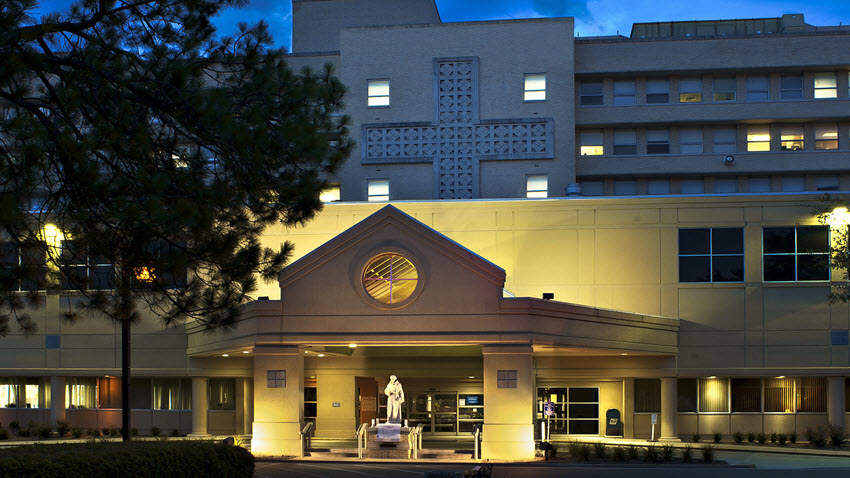
Neuroscience Services
Anytime you or a loved one receives a diagnosis involving delicate structures in the body, the fear can be a little overwhelming. At St. Francis, we understand the apprehension and anxiety felt when neurological or neurosurgical healthcare is needed. The good news is that if you live in Northeast Louisiana, you'll be comforted to know that St. Francis offers a comprehensive level of neurological and neurosurgical services available - all close to home. Our team approach to holistic care for our patients is what sets St. Francis Medical Center apart in our community.
Our care integrates a broad spectrum of clinical services bringing together specialists from nearly every field involved in neurological treatment including physiatry, neurology, neurosurgery and rehabilitation, all in one convenient location. Multidisciplinary care teams, through a flexible network, provide seamless treatment and coordination of care from diagnosis to discharge.
These teams include neurohospitalists, neurosurgeons, neuroradiologist, physiatrists, nurses, therapists, social workers, certified nurse aides, radiology and laboratory specialists, chaplains, and many others, all who maintain expertise in the field of neuroscience. The specialists associated with the Neuroscience Services at St. Francis provide a broad base of clinical expertise, providing specialized care.
Our team utilizes state-of-the-art technology to diagnose and treat our patients, on both an inpatient and outpatient basis. At St. Francis, skilled neurosurgeons utilize a state-of-the-art StealthStation® Treatment Guidance System that shows 3-dimensional real time images of the surgical procedures in progress. For the surgeon, this means more precision - and for the patient, this results in shorter operating time which means less anesthesia for the patient and quicker recovery. As the first and only healthcare provider in our area to utilize the StealthStation® System, St. Francis continues to be the leader in using cutting edge neuronavigation technology.
Our pride is reflected in our experienced staff and clinicians, as well as through the warm, relaxed and friendly atmosphere. Taking care of the patient - physically, mentally, and emotionally - contributes to the overall health and well-being of the patient.
"St. Francis is the one and only medical center in our area providing a dedicated Neurosurgical Intensive Care Unit (NS ICU) for a higher level of care," Dr. Bernie McHugh, neurosurgeon said. "This new unit is strictly for the treatment of neurosurgical patients in a critical care setting."
Neuroscience case studies are presented and discussed weekly in a collaborative effort between physicians and staff that are involved in providing care for neuroscience patients. These studies have been very successful in improving quality and coordination of patient care. What makes Neuroscience Services at St. Francis so effective is the emphasis on technology, coordination and quality while providing complete patient care in a timely manner, close to home, and near family and friends.
An expert staff of neurosurgeons, a neuroradiologist, the area's only pediatric neurologist, and physiatrists, together with our certified nursing staff and clinical support team, provides highly specialized care 24/7 for patients affected by diseases, disorders, and injuries that include:
- Brain Aneurysm
- Brain Tumor
- Degenerative Spine Disease
- Epilepsy
- Head Trauma
- Multiple Sclerosis
- Spinal Cord Injury
- Stroke
Our goal at St. Francis is to educate you and your loved ones on being able to recognize the signs of a stroke.
What is Stroke?
Stroke is a disease that affects the arteries leading to and within the brain. Strokes are the fifth leading cause of death and a leading cause of serious long-term disability in America. Every second counts! The faster someone can be treated, the more likely they are to recover without permanent disability. If you suspect someone is suffering from a stroke, call 911. A stroke occurs when a blood vessel that carries oxygen and nutrients to the brain is either blocked by a clot or bursts. When that happens, part of the brain cannot get the blood (and oxygen) is needs, so it starts to die. Stroke can be caused either by a clot obstructing the flow of blood to the brain (called an ischemic stroke) or by a blood vessel rupturing and preventing blood flow to the brain (called a hemorrhagic stroke). A TIA (transient ischemic attack), or "mini-stroke", is caused by a temporary clot.
Know the Warning Signs!
- Sudden weakness or numbness in face, arm, or leg
- Sudden confusion, trouble speaking or understanding
- Sudden vision trouble
- Sudden trouble walking or loss of balance
- Sudden, severe headache
Reporting
Thrombolytic
Thrombolytics, Alteplase (Activase) or Tenecteplase (TNK-tPA), are a type of medication used for thrombolysis or as a “clot buster” to dissolve the clot blockage within the artery during a stroke. Effectiveness of this medication decreases with time and does have a risk for bleeding following the administration. Not all patients are candidates for this treatment as there are certain inclusion/exclusion criteria requirements.
| Benchmark Group | Numerator | Denominator | % of Patients |
| St. Francis | 0 | 12 | 0% |
| All Hospitals | 232 | 9,307 | 2.5% |
Thrombectomy
A thrombectomy is a procedure performed to remove a clot that is blocking on of the large arteries of the brain during a stroke. This procedure is performed by inserting a catheter with a device attached to remove the clot. This procedure can be done in addition to the administration of a thrombolytic (tPA) medication or without, however effectiveness of this procedure decreases with time. Not all patients are candidates for this procedure as there are certain inclusion/exclusion criteria requirements.
| Benchmark Group | Numerator | Denominator | % of Patients |
| St. Francis | 0 | 6 | 0% |
| All Hospitals | 1,017 | 15,067 | 6.7% |
